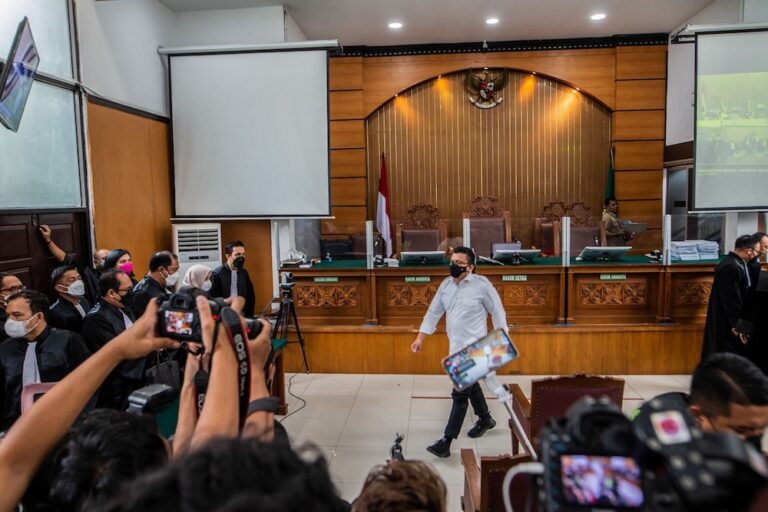Human Rights Watch is concerned that past torture and ill-treatment of political prisoners in Ambon puts the detained activists at serious risk.
(Human Rights Watch/IFEX) – New York, August 11, 2010 – The Indonesian authorities should immediately release the activists for Moluccan independence arrested in Ambon at the beginning of August 2010, Human Rights Watch said today. The activists were allegedly planning to float banned Moluccan independence flags attached to balloons to protest an August 3 visit by President Susilo Bambang Yudhoyono.
Local sources reported that between 7 and 15 activists were arrested in connection with balloon launch plans to express political opposition to Indonesian rule in the Moluccas Islands. The police reportedly confiscated as evidence 133 posters that read “Free Alifuru and Papua Political Prisoners,” two copies of the June 2010 Human Rights Watch report “Prosecuting Political Aspiration,” 17 separatist Southern Moluccas Republic (Republik Maluku Selatan or RMS) flags, and one 12-pound gas cylinder to be used to fill the balloons. Yudhoyono was in Ambon to open the “Sail Banda” event, organized by the Tourism Ministry and the Moluccas Islands government to promote tourism in the Banda Sea.
“Sadly, free speech in Indonesia is about as sturdy as the detained activists’ balloons,” said Phil Robertson, deputy Asia director at Human Rights Watch. “The Indonesian government publicly claims that it respects freedom of expression, so it should live up to its word and free these peaceful protesters immediately.”
Human Rights Watch expressed grave concern that past torture and ill-treatment of political prisoners in Ambon puts the recently detained activists at serious risk. The detainees should have immediate access to family members and legal counsel, Human Rights Watch said.
Those arrested include Benny Sinay, Izak Sapulete, Andy Marunaya, Edwin Marunaya, Ongen Krikof, Marven Bremer, Steven Siahaya, and Ony Siahaya. Jacob Sinay, who lost his civil service job in December 2009 because of his political activism, is also being held. Most were arrested at their homes on August 2 and 3. Some were also arrested because they publicly unfurled the separatist RMS flag in some places in the archipelago, including on Ambon and Saparua islands.
Observers at the Sail Banda event in the Yos Sudarso seaport in Ambon described what they considered to be a very large deployment of police officers and military personnel. The security forces apparently sought to prevent a repeat of Yudhoyono’s June 29, 2007 visit, when 28 local Moluccan dancers were able to enter the Ambon stadium, dance the cakalele war dance, and unfurl the RMS flag.
More than 70 men were arrested after the 2007 dance. Many were tortured after being handed over to Anti-Terror Unit 88 forces based in Ambon. The Ambon district court convicted more than three dozen of them, including the dance leader Johan Teterisa, of treason and sentenced them to prison terms ranging from 5 to 20 years. Teterisa was sentenced to 15 years and is in the Malang prison in eastern Java.
Human Rights Watch expressed concern that Ambon authorities confiscated the recent Human Rights Watch report, “Prosecuting Political Aspiration,” as possible evidence in a case against the activists. The report profiles the cases of 10 prominent Papuan and Moluccan activists currently behind bars for expressing their political views, and details ill-treatment they suffered in detention and violations of their due process rights.
In June, Human Rights Watch discussed the findings of the report in Jakarta with officials from the Law and Human Rights Ministry, the Foreign Affairs Ministry, and the National Commission on Human Rights. At least 100 Papuans and Moluccans are in prison in Indonesia for peacefully expressing their political views.
“By arresting the Ambon activists, the Indonesian authorities are repeating the very mistakes that raised doubts globally about Indonesia’s commitment to improving human rights,” Robertson said. “The government should release these peaceful protesters immediately and spare the country further international condemnation.”
BACKGROUND:
Human Rights Watch takes no position on claims to self-determination in Indonesia or in any other country. Consistent with international law, Human Rights Watch supports the right of all individuals, including independence supporters, to express their political views peacefully without fear of arrest or other forms of reprisal.
Most of the current political prisoners in Indonesia were convicted of makar (treason) under articles 106 and 110 of the Indonesian Criminal Code.
However, freedom of expression is protected both in Indonesia’s constitution and international human rights law. The constitution in article 28(e) states, “Every person shall have the right to the freedom of association and expression of opinion.” Article 28(f) provides, “Every person shall have the right to communicate and obtain information for the development of his/her personal life and his/her social environment, and shall have the right to seek, acquire, possess, keep, process, and convey information by using all available channels.”
In December 2007, the Indonesian government issued Government Regulation 77/2007, which regulates regional symbols. Article 6 of the regulation bans display of flags or logos that have the same features as “organizations, groups, institutions or separatist movements.” Both the Papuan Morning Star flag and the RMS flag are considered to fall under this ban.
The International Covenant on Civil and Political Rights, which Indonesia ratified in 2006, also protects the right to free expression. Under article 19, “(e)veryone shall have the right to freedom of expression; this right shall include freedom to seek, receive and impart information and ideas of all kinds, regardless of frontiers, either orally, in writing or in print, in the form of art, or through any other media of his choice.”
Click here to read the report “Prosecuting Political Aspiration”
Click here to read “Indonesia: Stop Prosecuting Peaceful Political Expression”


